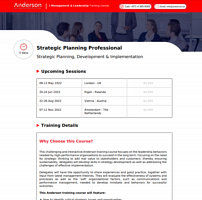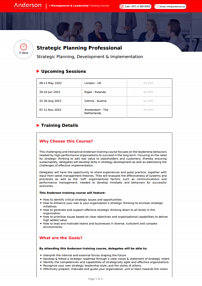- Course Finder
- Formats
- Training Topics
- Business Strategy
- Management & Leadership
- Personal Development Skills
- Innovation & Creativity
- Emotional Intelligence
- Governance and Compliance
- Business & Life Synergy
- Business Agility
- Business Sustainability
- Executive & Administrative Support
- Customer Service
- Sales & Marketing
- Human Resource HR Management
- Finance & Budgeting
- Data Science and Protection
- Project Management
- CertNexus
- Special Courses
- 10 Day Seminars
- The Essential Skills
- The Advanced Skills
- The Mini MBA Series
- Bootcamps
- Training Venues
-
- Certificates
- Calendars
- About us
- الدورات العربية
We currently have no scheduled session for this Training Course. If you are interested in running this course, please contact our Training Department at info@anderson.ae
Training Course Overview
Many famous business gurus such as Peter Drucker, John Kotter and Jim Hemerling have stressed in their publications the need for innovation in business without addressing the effect of change. If implementing new ideas and gaining acceptant for them where as straightforward as they suggest, why then are change programmes fraught with challenges?
This Anderson training course explores the drivers for change, the effective communication of change initiatives and the and engagement needed from all concerned to implement change effectively, using examples drawn from a wide range of organisations successful and less so.
This Anderson training course will feature:
- Why change – The forces which drive the need for change.
- Evolution not Revolution – improving and developing rather than trashing and destroying.
- Communication and the importance of emotionally intelligent messages
- Understanding the reactions and responses to change including Imposed versus Intentional Change and Circles of Concern and Control
- Tracking the benefits – did the change deliver against expectations.
Training Course Objectives
By the end of this Anderson training course, participants will be able to:
- Develop a commercially sound proposal for the change.
- Determine the current ways of working and the adjustments needed.
- Communicate the reasons and the expectations of the changes proposed.
- Analyse and manage the reactions and responses from stakeholder affected by the changed proposed, including and engaging change-resistors.
- Monitor progress and evaluate result, communicating in a positive way, learning from lessons learnt and adapting plans accordingly.
Designed For
This Anderson training course is ideally suited those with the accountability for staff and responsible for devising and implementing business changes ranging from procedural changes through to major organisational change projects including relocations, restructure, acquisitions and mergers.
This Anderson training course is suitable to a wide range of professionals but will greatly benefit:
- Senior Leaders and Executive Board Members
- Operational Managers and Functional Specialists
- Team Leaders
- HR and OD Managers
- Project Managers
Learning Methods
Highly participative, the programme explores the impact and effect of change from a variety of angles such as purpose; productivity; profitability; people; process and procedures.
This Anderson training course will utilise a variety of proven adult learning techniques to ensure maximum understanding, comprehension and retention of the information presented. This includes working in small discussion groups tasked with solving problems, exploring scenarios and case studies to identify best practice; and tutor-led content.
Day One: Why change
- Identifying the business drivers for change
- Exploring the risks of doing nothing
- Building the business case for change.
- Reviewing examples of change handled well.
- Exploring poor change management and lack of innovation.
- Reviewing the opportunities afforded by change.
Day Two: Evolution not revolution
- Understanding the nature of change
- Auditing what needs to change
- Maintaining existing best practice
- Evaluating options
- Piloting changes in isolation
- Scaling up and managing expansion
Day Three: Communication and the importance of emotionally intelligent messages
- Considering the message – what is the purpose or goal of the change.
- Planning the cascade – who, what, when, where, how, why
- Communication methodology
- Managing the grapevine and dealing with rumours
- Capturing all stakeholders
- Following through with updates
Day Four: Understanding the reactions and responses to change
- The Human Response to change using the Change Curve model.
- Imposed change – dealing with the loss of control.
- Intentional Change – engaging stakeholders to be involved.
- Using the WIFFM Factor in seeking commitment to change.
- Applying empathy to conversations with staff affected badly by changes planned.
- Providing moral support during the highs and lows of the change journey.
Day Five: Tracking the benefits
- Defining improvement measurements
- Reviewing and monitoring change progress
- Communicating successes linked to new approaches.
- Bursting the reminiscent bubble – the myths created in the good old days.
- Celebrating progress, recognising and rewarding transformation
- Anderson Certificate of Completion will be provided to delegates who attend and complete the course
Training Course Overview
Many famous business gurus such as Peter Drucker, John Kotter and Jim Hemerling have stressed in their publications the need for innovation in business without addressing the effect of change. If implementing new ideas and gaining acceptant for them where as straightforward as they suggest, why then are change programmes fraught with challenges?
This Anderson training course explores the drivers for change, the effective communication of change initiatives and the and engagement needed from all concerned to implement change effectively, using examples drawn from a wide range of organisations successful and less so.
This Anderson training course will feature:
- Why change – The forces which drive the need for change.
- Evolution not Revolution – improving and developing rather than trashing and destroying.
- Communication and the importance of emotionally intelligent messages
- Understanding the reactions and responses to change including Imposed versus Intentional Change and Circles of Concern and Control
- Tracking the benefits – did the change deliver against expectations.
Training Course Objectives
By the end of this Anderson training course, participants will be able to:
- Develop a commercially sound proposal for the change.
- Determine the current ways of working and the adjustments needed.
- Communicate the reasons and the expectations of the changes proposed.
- Analyse and manage the reactions and responses from stakeholder affected by the changed proposed, including and engaging change-resistors.
- Monitor progress and evaluate result, communicating in a positive way, learning from lessons learnt and adapting plans accordingly.
Designed For
This Anderson training course is ideally suited those with the accountability for staff and responsible for devising and implementing business changes ranging from procedural changes through to major organisational change projects including relocations, restructure, acquisitions and mergers.
This Anderson training course is suitable to a wide range of professionals but will greatly benefit:
- Senior Leaders and Executive Board Members
- Operational Managers and Functional Specialists
- Team Leaders
- HR and OD Managers
- Project Managers
Learning Methods
Highly participative, the programme explores the impact and effect of change from a variety of angles such as purpose; productivity; profitability; people; process and procedures.
This Anderson training course will utilise a variety of proven adult learning techniques to ensure maximum understanding, comprehension and retention of the information presented. This includes working in small discussion groups tasked with solving problems, exploring scenarios and case studies to identify best practice; and tutor-led content.
Day One: Why change
- Identifying the business drivers for change
- Exploring the risks of doing nothing
- Building the business case for change.
- Reviewing examples of change handled well.
- Exploring poor change management and lack of innovation.
- Reviewing the opportunities afforded by change.
Day Two: Evolution not revolution
- Understanding the nature of change
- Auditing what needs to change
- Maintaining existing best practice
- Evaluating options
- Piloting changes in isolation
- Scaling up and managing expansion
Day Three: Communication and the importance of emotionally intelligent messages
- Considering the message – what is the purpose or goal of the change.
- Planning the cascade – who, what, when, where, how, why
- Communication methodology
- Managing the grapevine and dealing with rumours
- Capturing all stakeholders
- Following through with updates
Day Four: Understanding the reactions and responses to change
- The Human Response to change using the Change Curve model.
- Imposed change – dealing with the loss of control.
- Intentional Change – engaging stakeholders to be involved.
- Using the WIFFM Factor in seeking commitment to change.
- Applying empathy to conversations with staff affected badly by changes planned.
- Providing moral support during the highs and lows of the change journey.
Day Five: Tracking the benefits
- Defining improvement measurements
- Reviewing and monitoring change progress
- Communicating successes linked to new approaches.
- Bursting the reminiscent bubble – the myths created in the good old days.
- Celebrating progress, recognising and rewarding transformation
The Certificate
-
Anderson Certificate of Completion will be provided to delegates who attend and complete the course
Info & In-house Solution
For more information about this course, call or email us at:
Call us: +971 4 365 8363





